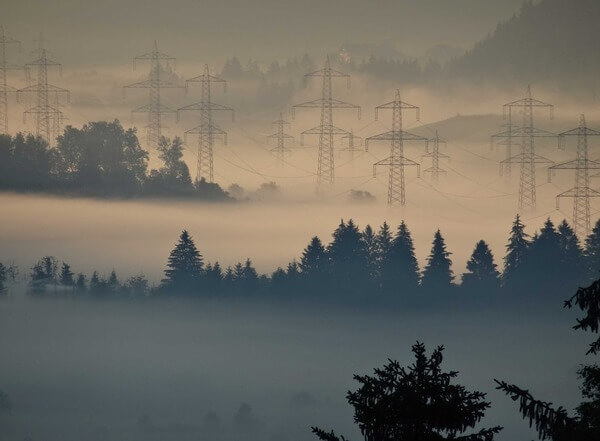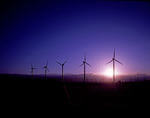News Release from windfair.net
Wind Industry Profile of
Energy transition and its numerous opponents
In France, developers of onshore wind power projects will have a hard time in the future. In mid-June, the Ministry of Defense issued an order requiring wind turbines to be installed at least 70 kilometers away from military radar installations, instead of the previous 30 kilometers. The idea is to prevent wind turbines from interfering with radar signals, as The Connexion reports.
This will significantly limit the area where wind farms can be built in France. Paul Neau, a member of the environmental research organizations négaWatt and Abies, told La Dépêche that the new rule "would increase the amount of land covered by military radars by five times." If aviation and weather radars are also included, suddenly 30 to 40 percent of the land in France is no longer suitable for turbine installations.
In the same move, the country's mayors have been given the right to veto new wind turbines in order to get the local council involved first. The new rule would also mean that local referendums could be held on whether turbines should be installed or not. What is common practice in Germany has not been practiced in France so far. The French environment minister therefore criticized the measure, which must, however, be approved by parliament before it becomes law.
The German example shows how external influence can wreak planned construction projects. The Brandenburg Minister of Economics, Jörg Steinbach, recently criticized the German planning law. Approvals would take far too long. Thus he has called for a reform - including a restriction of the right to sue for environmental associations - according to rbb24.
Specifically, he cited the legal dispute over the construction of a Tesla factory near Berlin, calling it "questionable with what justification a Bavarian environmental association is involved here in Brandenburg against the Tesla settlement." He also said the length of the legal proceedings must be put to the test. "This includes the question of how far the number of judicial instances can be reduced," according to rbb24.

Construction work on part of a transmission line running from north to south Germany has been halted for the time being (Image: Pixabay).
Transmission system operator 50Hertz also sees itself as a victim of such lawsuits. Last week e.g. the Federal Administrative Court (BVerwG) issued an expedited ruling on the Uckermark line between the Bertikow and Neuenhagen substations near Berlin in the administrative dispute brought by NABU Brandenburg, a nature association, against the State Office for Mining, Geology and Raw Materials (LBGR). This stops the construction of the urgently needed power line in the Schorfheide biosphere reserve until a final decision is made.
In the opinion of 50Hertz, the Federal Administrative Court weights the concerns of bird protection very highly. "We now hope that the court will quickly take up the case on the merits so that the situation can be clarified quickly and this line construction project, which is so important for the decarbonization of our economy and society, can continue to be implemented," commented Stefan Kapferer, CEO of 50Hertz.
According to 50Hertz, the current decision makes it clear that the political will to achieve climate protection targets faster than before is not in line with the reality of planning and approval processes. In concrete individual cases, climate protection always ranks behind other legally enforceable rights such as nature conservation and protection of species.
Interested people in small wind turbines in Germany also have to deal with the problem. Hans-Günter Feddersen, managing director of small wind turbine manufacturer EasyWind, reports running the gauntlet with the authorities involved, even though his EasyWind 6 turbine has already been installed at more than 300 locations in Germany and abroad.
 He told German media outlet Energie und Management that it was mainly due to the building authorities, which in many districts and cities either extremely slowed down the approval processes or even prevented them in the end: "This is a disaster." Thus the Husum building authority in northern Germany demanded a bird protection report from an applicant, which ended up costing around 5,000 euros. The current operator had the expert opinion drawn up because he wanted to erect the turbine on his property nevertheless. If he had let the business figures alone speak for themselves, the turbine would never have been built: With an investment of around 27,500 euros, there is hardly any room for improvement. Without a good dose of idealism, the whole thing would not have paid off.
He told German media outlet Energie und Management that it was mainly due to the building authorities, which in many districts and cities either extremely slowed down the approval processes or even prevented them in the end: "This is a disaster." Thus the Husum building authority in northern Germany demanded a bird protection report from an applicant, which ended up costing around 5,000 euros. The current operator had the expert opinion drawn up because he wanted to erect the turbine on his property nevertheless. If he had let the business figures alone speak for themselves, the turbine would never have been built: With an investment of around 27,500 euros, there is hardly any room for improvement. Without a good dose of idealism, the whole thing would not have paid off.
But that's not all. For some time now, the Husum building authority has also been demanding an ice throw assessment for new applications. EasyWind attributes this to the lack of a lobby for small wind turbines - and is thus in good company, because the lobby for large megawatt turbines is often lacking with the relevant authorities and politicians. And so, in the end, the loudest ones prevail again, because when the automotive industry comes knocking, the red carpet is rolled out for them (Image above: Pixabay).
- Author:
- Katrin Radtke
- Email:
- press@windfair.net
- Keywords:
- France, Germany, energy transition, politics, permitting, process, association, nature, climate change, protection, wind turbine, wind farm











